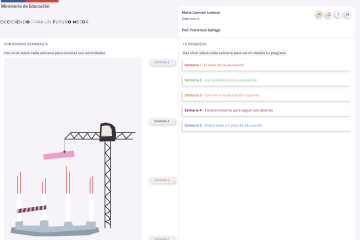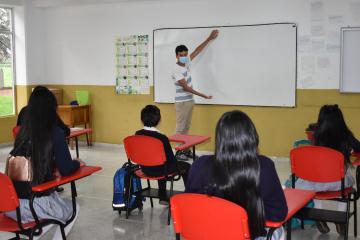
Online Tutoring: a Promising Solution for Accelerating Learning

This piece was originally published on the Inter-American Development Bank's blog.
During the Covid-19 pandemic, online tutoring emerged as a potential solution to education challenges resulting from school closures on a massive scale. We are just having a first glimpse of the consequences of the pandemic on students’ outcomes—and it does not look good. Estimates indicate that school closures might push 24 million children out of school, four out of five countries had learning losses, students are lagging behind, and educational gaps have widened. And the most marginalized students are experiencing the worst effects.
Many of these challenges existed before the pandemic. However, the pandemic created added urgency for finding out-of-the-box solutions, even as conditions begin to return to normal.
Big Problems Require Innovative Solutions
One innovative initiative developed in Italy amidst the pandemic is the Tutoring Online Program (TOP). In 2020, shortly after schools closed in Italy, we (Michela Carlana at Harvard University and Eliana La Ferrara at Bocconi University) partnered with pedagogical experts to implement a tutoring program that could be delivered remotely to students from disadvantaged backgrounds who were struggling during distance learning.
Within a few weeks, our team developed the content of the program, reached out to schools in Italy to identify potential tutees, recruited tutors, and in April, we launched TOP.
Before this program was implemented, numerous studies already suggested that tutoring—that is, supplemental individual or small group instruction sessions—could lead to large improvements in learning outcomes.
However, conscious of the lack of evidence on online tutoring, our research team ran a randomized evaluation to test the effectiveness of having volunteer tutors providing three to six hours of remote tutoring each week during the five weeks that the program lasted.
The results were positive, pointing out TOP as a program was worth being expanded. The intervention enhanced academic performance as well as socio-emotional skills, aspirations, and well-being. This encouraged our research team to expand TOP in Italy, and implement and evaluate it in the Dominican Republic together with Astrid Pineda, where it also had promising results.
Online Tutoring in a Post-Pandemic Context
One might wonder if it makes sense to continue a program like TOP now that schools are open. It certainly does. On the one hand, both online and in-person tutoring allows educators to tailor instruction to each student’s learning level, a practice that has been found to be a cost-effective alternative when students are falling behind the curriculum and there is large variation in learning levels within classrooms. That is precisely what is happening in the aftermath of school closures.
On the other hand, innovative tutoring programs might be more viable to expand than “traditional” tutoring interventions.
The Top Reasons Why Online Tutoring is Scalable
There are two characteristics that make TOP especially well suited to be scaled at the magnitude that the current educational crisis demands:
- It is offered by volunteers.
- It is delivered remotely.
Relying on volunteers instead of paid professionals allows TOP to reduce costs considerably and to identify highly motivated instructors. Having online sessions avoids commuting and facilitates scheduling, which makes the project much more attractive for potential tutors and allows students from remote areas to benefit.
Next steps in Latin American Countries
Taking into account previous results of TOP and its advantages over some other interventions that seek to improve educational outcomes, we decided to expand the reach of the program.
The program continues to be implemented in the Dominican Republic and in Italy, transitioning to a model where the application of the program is led by an NGO (CIAI). Our research team is now bringing TOP to Rio de Janeiro, Brazil and Uruguay, together with the technical and financial cooperation of the Interamerican Development Bank (IDB), in coordination with local authorities and implementers.
We are not the only ones that see online tutoring as a promising path. Online tutoring has been presented as a means to accelerate learning, that is, it can help prepare children to master upcoming content, instead of just rushing them through the same study plan in which they are lagging.
The IDB is also pushing in this direction and is supporting several online tutoring initiatives in Latin America and the Caribbean.
We believe that joint work between governments, academia, and different organizations will help to build a community of practice and improve online tutoring so that it can be effectively delivered to those that need it the most.






